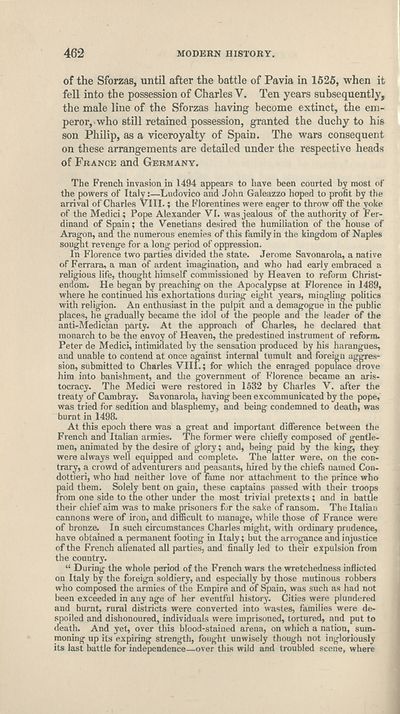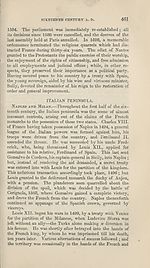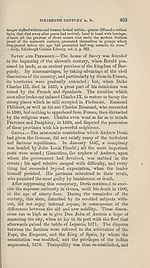Download files
Complete book:
Individual page:
Thumbnail gallery: Grid view | List view

462
MODERN HISTORY.
of the Sforzas, until after the battle of Pavia in 1525, when it
fell into the possession of Charles V. Ten years subsequently,
the male line of the Sforzas having become extinct, the em¬
peror, who still retained possession, granted the duchy to his
son Philip, as a viceroyalty of Spain. The wars consequent
on these arrangements are detailed under the respective heads
of France and Germany.
The French invasion in 1494 appears to have been courted by most of
the powers of Italy:—Ludovico and John Galeazzo hoped to profit by the
arrival of Charles VIII.; the Florentines were eager to throw off the voke
of the Medici ; Pope Alexander VI. was jealous of the authority of Fer¬
dinand of Spain; the Venetians desired the humiliation of the house of
Aragon, and the numerous enemies of this family in the kingdom of Naples
sought revenge for a long period of oppression.
In Florence two parties divided the state. Jerome Savonarola, a native
of Ferrara, a man of ardent imagination, and who had early embraced a
religious life, thought himself commissioned by Heaven to reform Christ¬
endom. He began by preaching on the Apocalypse at Florence in 1489,
where he continued his exhortaUons during eight years, mingling politics
with religion. An enthusiast in the pulpit and a demagogue in the public
places, he gradually became the idol of the people and the leader of the
anti-Medician party. At the approach of Charles, he declared that
monarch to be the envoy of Heaven, the predestined instrument of reform.
Peter de Medici, intimidated by the sensation produced by his harangues,
and unable to contend at once against internal tumult and foreign aggres¬
sion, submitted to Charles VIII.; for which the enraged populace drove
him into banishment, and the government of Florence became an aris¬
tocracy. The Medici were restored in 1532 by Charles V. after the
treaty of Cambray. Savonarola, having been excommunicated by the pope,
was tried for sedition and blasphemy, and being condemned to death, was
burnt in 1498.
At this epoch there was a great and important difference between the
French and Italian armies. The former were chiefly composed of gentle¬
men, animated by the desire of glory; and, being paid by the king, they
were always well equipped and complete. The latter were, on the con¬
trary, a crowd of adventurers and peasants, hired by the chiefs named Con-
dottieri, who had neither love of fame nor attachment to the prince who
paid them. Solely bent on gain, these captains [>assed with their troops
from one side to the other under the most trivial pretexts; and in battle
their chief aim was to make prisoners for the sake of ransom. The Italian
cannons were of iron, and difficult to manage, while those of France were
of bronze. In such circumstances Charles might, with ordinary prudence,
have obtained a permanent footing in Italy; but the arrogance and injustice
of the French alienated all parties, and finally led to their expulsion from
the country.
“ During the whole period of the French wars the wretchedness inflicted
on Italy by the foreign soldiery, and especially by those mutinous robbers
who composed the armies of the Empire and of Spain, was such as had not
been exceeded in any age of her eventful history. Cities were plundered
and burnt, rural districts were converted into wastes, families were de¬
spoiled and dishonoured, individuals were imprisoned, tortured, and put to
death. And yet, over this blood-stained arena, on which a nation, sum¬
moning up its expiring strength, fought unwisely though not ingloriously
its last battle for independence—over this wild and troubled scene, where
MODERN HISTORY.
of the Sforzas, until after the battle of Pavia in 1525, when it
fell into the possession of Charles V. Ten years subsequently,
the male line of the Sforzas having become extinct, the em¬
peror, who still retained possession, granted the duchy to his
son Philip, as a viceroyalty of Spain. The wars consequent
on these arrangements are detailed under the respective heads
of France and Germany.
The French invasion in 1494 appears to have been courted by most of
the powers of Italy:—Ludovico and John Galeazzo hoped to profit by the
arrival of Charles VIII.; the Florentines were eager to throw off the voke
of the Medici ; Pope Alexander VI. was jealous of the authority of Fer¬
dinand of Spain; the Venetians desired the humiliation of the house of
Aragon, and the numerous enemies of this family in the kingdom of Naples
sought revenge for a long period of oppression.
In Florence two parties divided the state. Jerome Savonarola, a native
of Ferrara, a man of ardent imagination, and who had early embraced a
religious life, thought himself commissioned by Heaven to reform Christ¬
endom. He began by preaching on the Apocalypse at Florence in 1489,
where he continued his exhortaUons during eight years, mingling politics
with religion. An enthusiast in the pulpit and a demagogue in the public
places, he gradually became the idol of the people and the leader of the
anti-Medician party. At the approach of Charles, he declared that
monarch to be the envoy of Heaven, the predestined instrument of reform.
Peter de Medici, intimidated by the sensation produced by his harangues,
and unable to contend at once against internal tumult and foreign aggres¬
sion, submitted to Charles VIII.; for which the enraged populace drove
him into banishment, and the government of Florence became an aris¬
tocracy. The Medici were restored in 1532 by Charles V. after the
treaty of Cambray. Savonarola, having been excommunicated by the pope,
was tried for sedition and blasphemy, and being condemned to death, was
burnt in 1498.
At this epoch there was a great and important difference between the
French and Italian armies. The former were chiefly composed of gentle¬
men, animated by the desire of glory; and, being paid by the king, they
were always well equipped and complete. The latter were, on the con¬
trary, a crowd of adventurers and peasants, hired by the chiefs named Con-
dottieri, who had neither love of fame nor attachment to the prince who
paid them. Solely bent on gain, these captains [>assed with their troops
from one side to the other under the most trivial pretexts; and in battle
their chief aim was to make prisoners for the sake of ransom. The Italian
cannons were of iron, and difficult to manage, while those of France were
of bronze. In such circumstances Charles might, with ordinary prudence,
have obtained a permanent footing in Italy; but the arrogance and injustice
of the French alienated all parties, and finally led to their expulsion from
the country.
“ During the whole period of the French wars the wretchedness inflicted
on Italy by the foreign soldiery, and especially by those mutinous robbers
who composed the armies of the Empire and of Spain, was such as had not
been exceeded in any age of her eventful history. Cities were plundered
and burnt, rural districts were converted into wastes, families were de¬
spoiled and dishonoured, individuals were imprisoned, tortured, and put to
death. And yet, over this blood-stained arena, on which a nation, sum¬
moning up its expiring strength, fought unwisely though not ingloriously
its last battle for independence—over this wild and troubled scene, where
Set display mode to:
![]() Universal Viewer |
Universal Viewer | ![]() Mirador |
Large image | Transcription
Mirador |
Large image | Transcription
| Antiquarian books of Scotland > Education > Elements of universal history on a new and systematic plan > (482) |
|---|
| Permanent URL | https://digital.nls.uk/127585924 |
|---|
| Description | Thousands of printed books from the Antiquarian Books of Scotland collection which dates from 1641 to the 1980s. The collection consists of 14,800 books which were published in Scotland or have a Scottish connection, e.g. through the author, printer or owner. Subjects covered include sport, education, diseases, adventure, occupations, Jacobites, politics and religion. Among the 29 languages represented are English, Gaelic, Italian, French, Russian and Swedish. |
|---|

